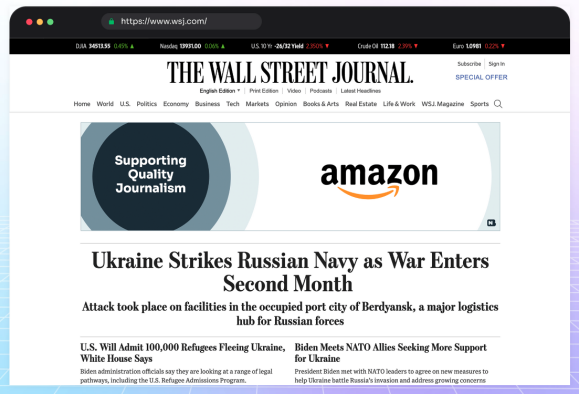
A new international collective of advertising executives, “Brands4News”, has launched a toolkit it hopes will bring ad bucks back to “brand-unsafe” news content.
As well as graphics emphasising brands’ support for journalism, the toolkit includes an inclusion list of verified safe news sites.
That list has some notable absences – including all UK tabloids and partisan US broadcasters Fox News and MSNBC.
The kit, at Brands4News.org, features a particular emphasis on getting advertising back on Ukrainian news sites, who Press Gazette reported last month have been suffering from a drought in ads partly caused by the big tech Duopoly.
Advertisers often fear buying ad space on articles covering weighty topics because of the danger their brand will be associated with the grim reading.
Ruben Schreurs (pictured), the group chief product officer at media investment analysis firm Ebiquity, said companies “don’t want to be the brand that gets screenshotted and shared everywhere as being an example of inconsiderate advertising.
“On the 24th, when the invasion [of Ukraine] started, there was an item on CNN about the air raid sirens in Kyiv. And a pre-booked ad by Applebee’s ran against that, promoting a fried chicken deal.”
The problem had been identified before the invasion: early in the pandemic news sites who were experiencing booming traffic were finding their revenues undercut because advertisers “blocklisted” certain words associated with Covid-19.
Many advertisers continue to use bans on certain keywords, despite evidence advertising against negative or even violent news on responsible sites does not hurt brands.
The contradictory result is that some of the most important hard news topics are the least financially sustainable for news organisations.
Schreurs began setting up Brands4News in March “to help brands support quality journalism by providing them with free-to-use creative templates designed to run against crisis-related news content”.
The scheme, which Schreurs self-funded and undertook separately from his employer, ultimately grew to 14 contributors predominantly drawn from the advertising industry.
Brands4News’ toolkit centres on its ad templates, which allow brands to “sponsor” content in a tonally appropriate way. The hope is the result makes clear brands are supporting journalism.

A sample of how Brands4News’ template would look on a website. Picture: Brands4News
Schreurs told Press Gazette: “I’ve worked in digital advertising for 11 years now. And I’ve always been frustrated by the fact that many advertisers tend to skew towards fluffy, entertainment-like content because of a fear of being inconsiderate when it comes to running against content that is maybe a bit more serious, especially during crises.”
Schreurs says the templates “clearly stipulate the cause and the intention – supporting quality journalism with a strong brand message, allowing brands to continue to build affinity and salience during a crisis.
“At the same time, it’s not a zero-sum game or a charitable act, because there’s a huge opportunity in quality news at the moment. Because [newsrooms] have readership spikes, but major revenue losses – so there is sort of a weird paradox going on, where they should be seeing more demand for ads, but because of the content, it goes down.
“So there’s a big opportunity to buy, if you will, discounted reach against quality audiences against what we see as guaranteed brand-safe content.”
There are four Ukrainians on the Brands4News team: one, creative production lead Dmitry Gnatiuk, designed the HTML5 banner templates in the evenings from a shelter in Kyiv.
Schreurs highlighted the particular value he hoped the service would offer to Ukrainian media.
“They are facing up to 90% revenue losses, but huge readership spikes also from new, non-Ukrainian audiences, as a combination of refugees having left Ukraine and still reading those titles, but also many people from the west are engaging with the local titles.
“Because you know, they bring news from the ground. So again, that’s why we created Ukrainian language versions [of the ad templates] as well, and the domain inclusion list to prompt brands to seize the opportunity to advertise there with a strong salient message.”
The English-language domain inclusion list was created in partnership with the Global Disinformation Index, which attempts to quantify a site’s “risk of disinforming readers” through a combination of AI and manual analysis.
All the sites on Brands4News’ list have been qualified as “trusted” by the GDI, and include news providers such as the BBC, the AP, Al Jazeera and The Guardian.
There are some notable omissions from that list: Mail Online, the Mirror, the Express and The Sun, for example, as well as Rupert Murdoch‘s upmarket Times are all missing. In the US, both Fox News and liberal MSNBC don’t make the list.
Is there a way for those publishers to get on the inclusion list?
"Absolutely, yes," Schreurs said.
"We are a collective of volunteers that want to make a start. So by no means is this now a comprehensive list. We really see it as a V 1.0... the plan is to continue to improve and iterate.
"And also we welcome, and even call for, help from the community. We have, on the website, in the FAQ - 'Why is this domain not included?', 'Can I request for domains to be added to the inclusion list?' - and we provide them with very clear information on where to contact us or request for certain properties to be added. And we will also proactively continue to expand the directory as we go."
Schreurs says the collective intends to follow demand into other languages as well.
Just because the list can grow does not mean anyone will be added, though.
Asked what factors go into GDI's determinations, Schreurs told Press Gazette that what differentiates it from some other trust markers is "something can be factual, and at the same time, misleading, or considered to be disinformation.
"For example, if you present certain numbers, crime figures around a certain demographic in a certain way, you can sort of insinuate a much larger problem by leaving out important context or other data."
Press Gazette asked if Fox News was likely to ever get included.
"Fox, for as long as I live, will never be included on this quality list."
Prompted to elaborate, Schreurs said: "I mean, Brands4News doesn't represent, or shouldn't be, [a] partisan initiative. And it isn't, by any means, that.
"However - I think probably the most clear representation of why Fox can't be included is how they are dealing with the Jan. 6 issue and the reporting around that. Or rather, how they are not running any reporting around the trials and the investigations.
"And we have a lot of blue or left wing media that also isn't included. So it's not about red or blue. It is about structural misrepresentation, or provision of disinformation and specifically inciting harm or violence."
Schreurs emphasised that the resources Brands4News provided were open-source and free to use for all.
"It would be great if at the very least we have been able to inspire some brands to think twice about pulling all their ads from quality journalism.
"The main thing that we as a collective are incredibly concerned about is that the perverse incentive for ad-funded media becomes: 'Let's just not cover the crisis'. Or: 'Let's start writing fluff pieces'.
"'You won't believe what these 11 actors from the 80s look like!'
"Because it's nice, it's entertaining, it's fluff. And you know, that will be the worst, if we lose quality independent journalism - well, I fear for the future of global society."
Press Gazette is hosting the Future of Media Technology Conference. For more information, visit NSMG.live
Picture: Brands4News.org
Email pged@pressgazette.co.uk to point out mistakes, provide story tips or send in a letter for publication on our "Letters Page" blog
